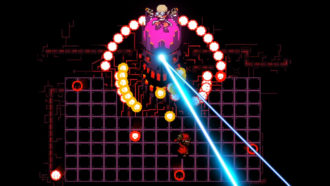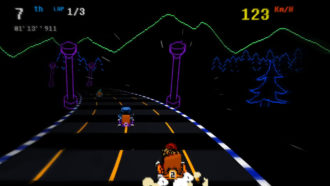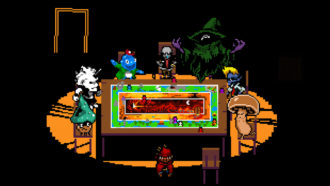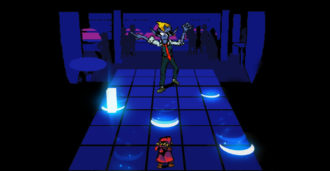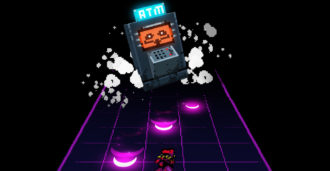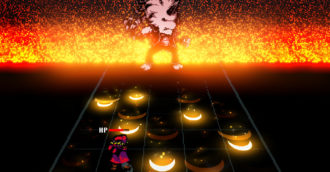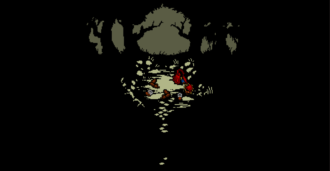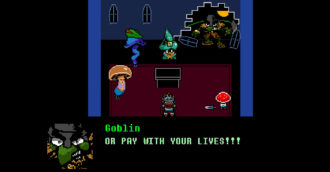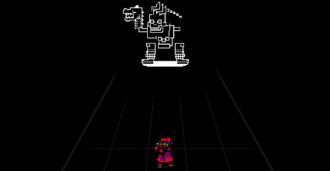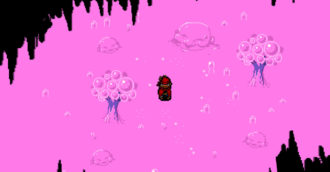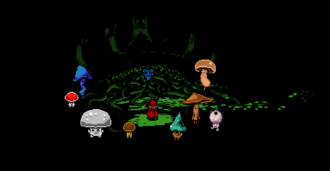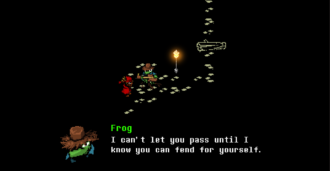Platforms:
PC, Nintendo Switch
Released:
March 4, 2021
Publisher:
Foreign Gnomes
Developer:
Foreign Gnomes
A strange underworld of disco beats and quirky characters, Everhood is an adventure-story game with a heavy emphasis on music. The odd project is put together by only two developers – artist Chris Nordgren and programmer Jordi Roca. They describe the game as “an ineffable tale of the inexpressible divine moments of truth”, which may be the only way to define it. Everhood is a unique experience that is hard to describe, but what it holds is so memorable it may be a cult classic.
Development on Everhood started in 2018 and a vertical slice of the first 20 minutes has been available since. With all its influences on its sleeves, it’s clear why this strange adventure has generated and held such a cult following for the last three years – now, it comes to full fruition.
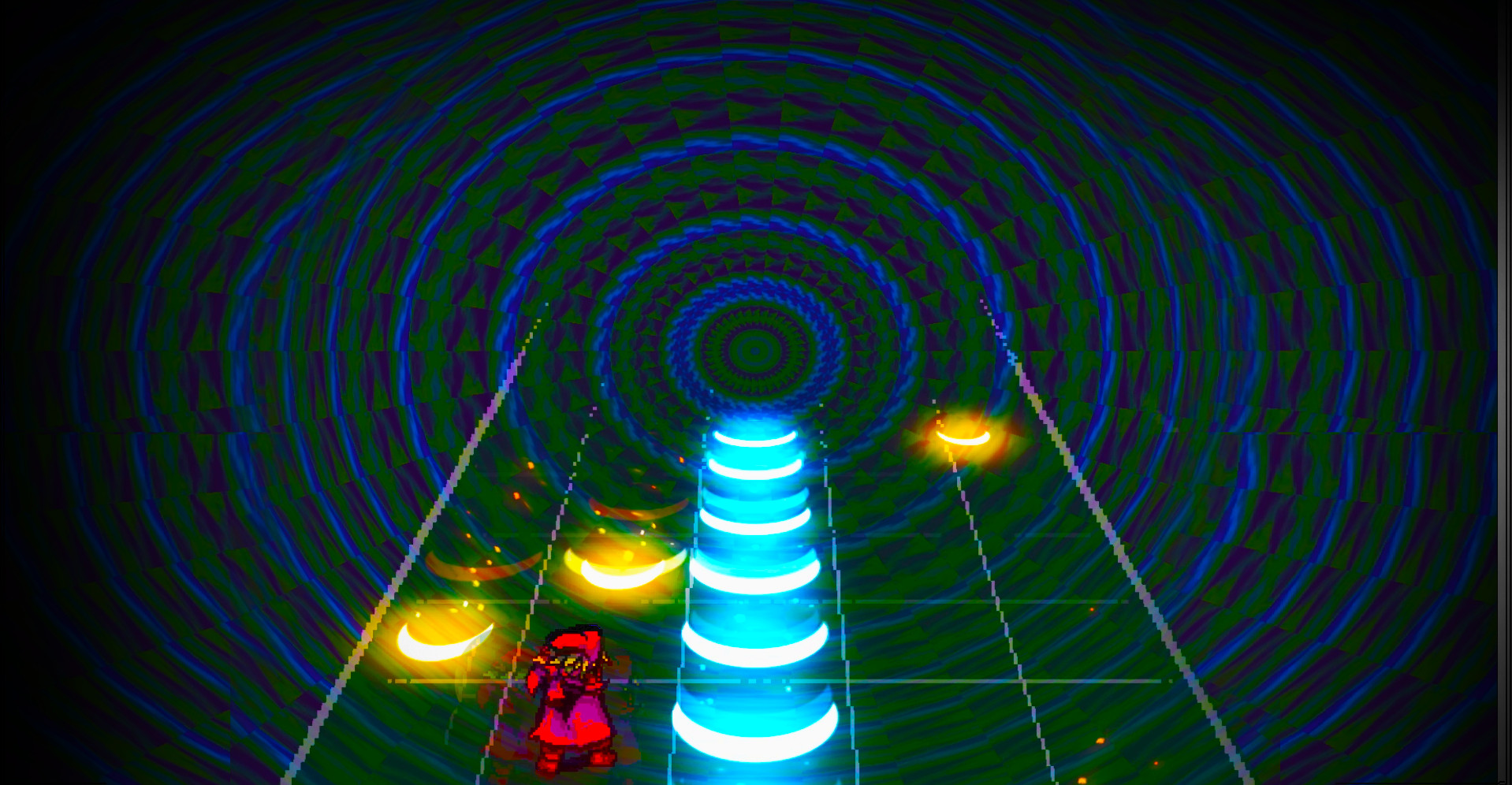
The story follows a wooden doll named Red, waking up in mysterious woods with no memory or backstory. Gold Pig, a tyrant who reigns over this vague world, steals one of Red’s arms with the help of Blue Thief the gnome… who then has their legs stolen and joins Red’s quest to retrieve their limbs. Red encounters a range of peculiar characters along the escapade, like Noseferatchu, Flan, Muck, and the wise Banjo Frog. Throughout the journey, an omnipresent voice and unexplainable occurrences hint at something darker behind the existence of this world.
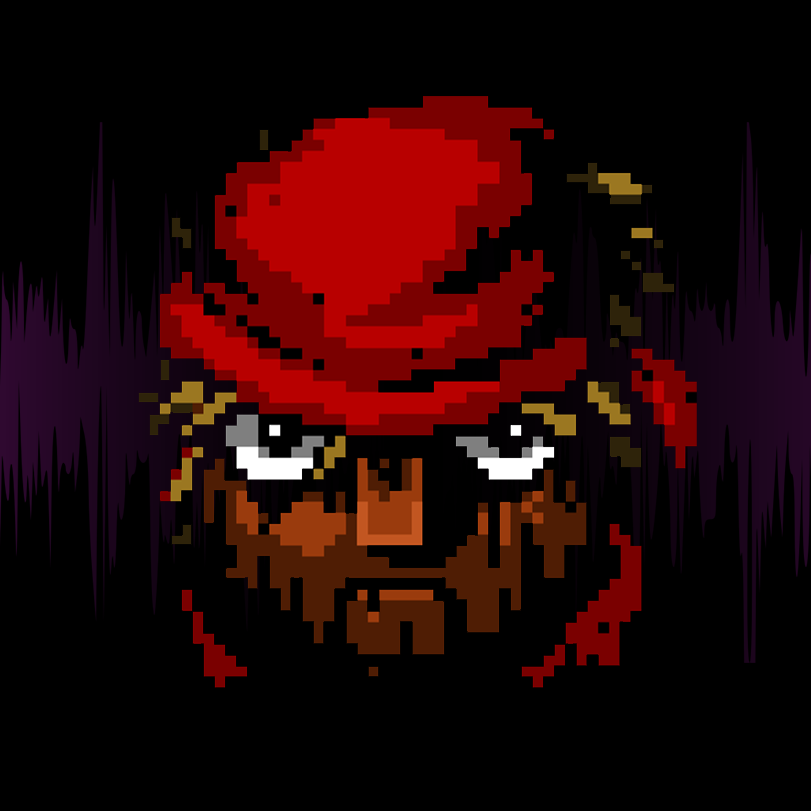
Everhood’s story is both a simple quest and an existential nightmare at the same time. The narrative is relatively linear but allows players to choose areas to explore. A hub world with several colourful doors lead to different zones and depending on the order you decide to enter them, you may confront hidden rooms or mysterious interactions. There’s a clear connection in the design between Everhood and Yume Nikki, drawing inspiration from the latter’s Prevalent Room. Throughout the overworld, Red will interact with characters and enter battles of musical skill. The writing is often witty or enigmatic, with a looming sense of dread ridden throughout the journey.
One of the unique parts of Everhood is the rhythm-based scenarios that replace traditional combat. Battles can be as simple as dodging colourful lines or full-on kaleidoscopic boss fights with exceptional tracks. Notes of different shapes and sizes will run down the screen to the beat of various music. Red can jump and dodge out of the way for most of the game to defeat the vicious sounds. These sections can be extremely difficult or an absolute cakewalk, depending on the difficulty level. The player has a health bar with three hit points and after a while, reliant on the difficulty chosen, health can regenerate.
The main goal is to survive until the track ends with the occasional curve thrown-in. One stage involves moving back and forth on a minecart to progress and another pits Red against two enemies at once, switching back and forth between two distinct types of music and patterns to dodge. There is also a side-mission which is basically F-Zero. While not being entirely crucial to the story, it is a fun change of pace. The music battles have so much variety even though they are a completely original idea for this game type.
“…music battles have so much variety even though they are a completely original idea for this game type.”
While Everhood may look like a rhythm game in the same vain as Guitar Hero or Audiosurf, it’s worth noting that the gameplay here is quite different. Despite music being a core focus of the experience, Everhood doesn’t adhere to the conventions you’d expect from the rhythm genre. Instead of moving to the music, players need to avoid notes – and there will always be more empty space than filled space – meaning you’re not getting that satisfaction of hitting the beat. Notes can fall in scattered patterns spread across the battle screen with little melody. With five lanes to pick from, players don’t need to dodge every note and can sit on one for long periods without much effort. I can’t help but feel this may be easily fixed by reducing the lanes to three.
Eventually, Red learns a reflect attack which adds another layer to these music-based combat pieces. It raises the difficulty by relying on good timing but making yourself vulnerable, requiring players to move much more and play offensively to win. It nearly removes the option to stay in one lane and defeat enemies effortlessly. Although, this mechanic isn’t available until very far into Everhood’s adventure and is sorely missed in the first part of the game.
In between these sections, Red explores undescribed locations and interacts with unusual characters. There are optional objectives, like searching for items to help other habitants of this strange universe or finding seven different mushroom friends in a forest. The environments Red travels through aren’t detailed or exciting, but that’s part of the style of Everhood. Darkness is a backdrop to the pixel-art, and with such puzzling subtext, everything resonates surreal isolation.
There are many psychedelic and indescribable moments that add to the spectacular journey and make you question what is going on in this story. The game draws heavily from the art and tone of twisted tales like Undertale. A magic eight ball constantly tells you to “agree to abandon your humanity, accept immortality”. What does this mean? Is that why Red is a wooden doll? Has Red done something to become immortal? Something inhumane? There is already a cult community debating the meaning of this game. It hits all those baffling narrative beats and digs deep into your soul until the only goal is to see it out to the end.
9
Amazing
Positive:
- Unique music-based battles with great tracks
- An enigmatic and engaging story
- Colourful and creative visuals and effects
- Wide cast of interesting characters
Negative:
- Not really a rhythm game
Everhood is its own surreal beast of indescribable nature. On the surface, the adventure is a straightforward story of thievery and reclaiming… but for what means? Underlying is a cryptic tale about humanity and the darkness burdening existence that many fans of these sorts of games will utterly love. The shadowy overworld and diverse characters along the journey are mysterious to match the game’s ineffable spirit. With an outstanding selection of music to battle to in the unique combat, each fight is a bopping joy with slight twists to the mechanics adding even more fun. Unlike Crypt of the Necrodancer or Geometry Dash, jumping and moving aren’t to the beat. As a result, this isn’t exactly a rhythm game. While its descriptor may not be accurate, it’s still a marvellous game. Already a cult hit with fans of Undertale and other games of the sort, Everhood is a bizarre and groovy adventure that can’t be missed.
